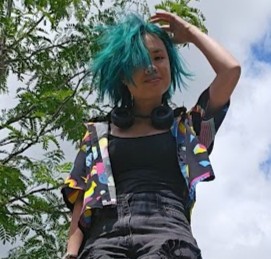
A Group of Mathematicians Walk into a Convention Center...
- 9 minsUnlike many people, I did not go bar-hopping on my 21st birthday.
Instead, I went out to dinner, ordered one glass of rosé, and crawled into bed at 10pm. After a long battle with sleep, I left the apartment at 4am to catch a flight to Boston. Why? I was attending the Joint Mathematics Meeting (JMM), the largest math conference in the world, to present a poster on research I had done the previous summer.
I spent the next five days running back and forth across the Prudential Center complex, located in the Back Bay neighborhood of Boston. It was a strange amalgamation: imagine a shopping mall, roughly in the shape of a plus sign. Two of the ends led to hotels, while another led to the train station. Interspersed were offices, restaurants, stores, and an outside garden park. I could attend a talk, grab lunch at a cafe, crash in my hotel room, catch the T, and browse the racks... all without stepping foot outside.
While slightly chaotic, it was very gorgeous. The mall itself boasted skylights and dripping golden lights. One wing was populated with plants and flowers, and had an arching glass wall - you could sit and gaze at the sky. To get to and from my hotel, I crossed a skybridge; stop in the middle, and you could see Huntington Avenue stretched out in front of you.
JMM was mainly held in the Hynes Convention Center. It didn't look like much, until I walked to the heart of the center. Here, it was more of an open atrium, standing at three stories tall. Facing northeast were floor-to-ceiling windows overlooking Boston, where many mathematicians worked on their presentations and research. Every single room or hall hosted a speaker at any given time; I often saw students racing up and down the escalators to attend a talk.
To be honest, my time at JMM was mostly a blur. I didn't have the chance, or motivation, to explore Boston as much as I had intended, since it was raining all week. And with a crammed event schedule from 8am to 8pm, I spent my time drifting from talk to talk, returning to my room for long cat-naps, and trying to meet up with other students.
Despite being a "mathematician" at math conference, I felt slightly out of place, for several reasons.
First, I wouldn't be able to tell you what I learned from the talks I did attend (unless they involved graph theory). In fact, I didn't understand most of them. While there's a certain beauty in the vastness of mathematics, it's overwhelming to get lost in the notation and theorems only five slides into the session.
Second, I have no interest in pursuing a PhD after I graduate. I've learned that's the third thing people will ask you at a conference, right after your name and institution. My academic status is sort of in limbo: I am currently studying for both a Bachelor's and Master's degree, with the intention of going into industry afterwards. So, I'm considered an undergraduate student, but am technically in grad school. Yet, it doesn't feel quite the same. When other people talk about applications, research interests, and the 'grad-student' life, I'm not a part of that conversation, nor would I have the right to be.
Nevertheless, some of my acquaintances felt a lot more at home. They pointed out how welcoming, if strange, it was: to sit a room, and realize every single person in it was like you. You didn't have to seek out fellow mathematicians - they were already there.
I, personally, did not have this revelation at JMM. It was only afterwards, when I had time to reflect, did I realize the connection I had to everyone else. That is not to say I belonged more than I thought (a bold statement). After all, I didn't suddenly change my mind about grad school, or soak up years of mathematical knowledge, in five days. Rather, I recognized smaller details. Moments of clarity. Cohesiveness. Continuity.
That's a little abstract. Let's move to empirical evidence.
The Look
It became fairly easy to spot another JMM-er, even if they didn't have on their badge. You could pass by a cafe or lobby and see students typing up a LaTeX file, finalizing their poster or presentation. Professors would walk in twos or threes, discussing the latest talk or their research. We smiled at each other in the elevators, nodded our heads in passing; I did a double take when a fellow classmate waved at me through the window of a Dunkin' Donuts.
And so, there were two groups walking the mall that week: the casual shoppers, and the academics. I had to belong in one or the other... and I wasn't there for a new wardrobe.
The Exhibition
Midway through the week, there was a ribbon-cutting ceremony and opening reception. Afterwards, attendees were free to explore the exhibition hall, comprising of art, vendor booths, free food, dancing, and a few magic shows. I spent the evening wandering the aisles, easily distracted by all sorts of nerdy things, including:
The Art
Or: everything from laser-cut sculptures to knitted Klein bottles. I walked through the displays at least three times, reading about fractals:
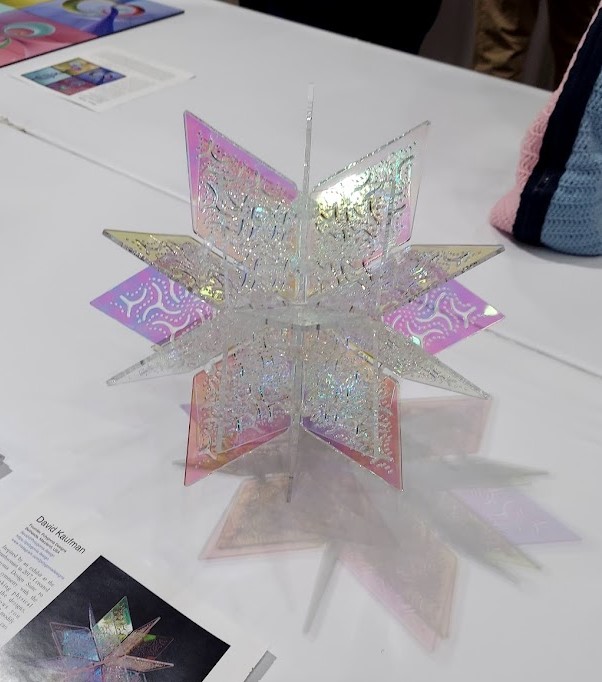
and admiring the geometric patterns:
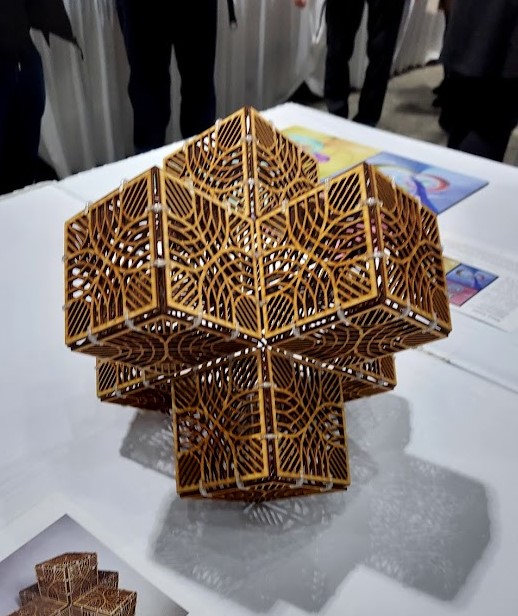
To my delight, I saw a level 3 Menger sponge (using 32,000 Lego bricks!):
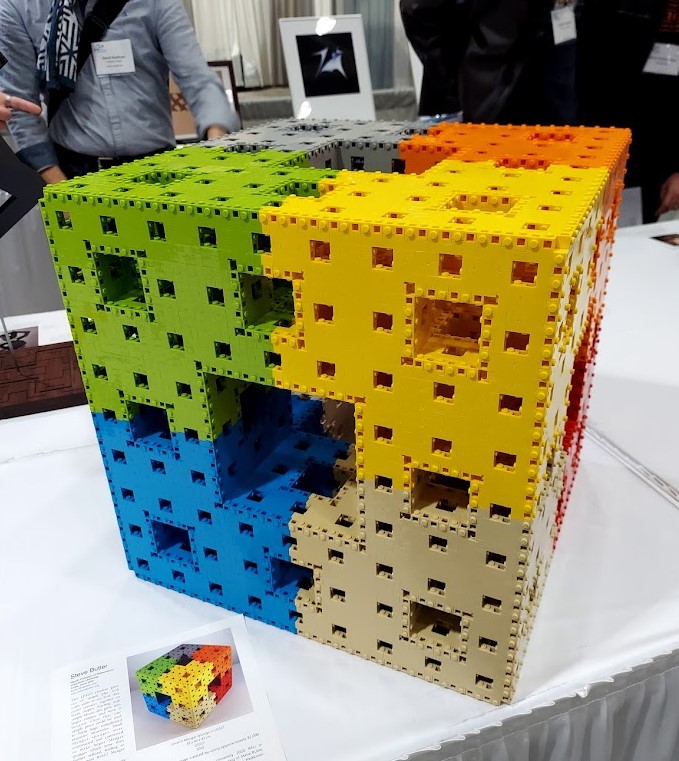
The Vendors
At some point, a friend urged us to follow him, because "these people are giving away free textbooks!" And indeed, plenty of students were claiming a book - all you had to do was leave your email. I eventually chose Nine Algorithms That Changed the Future, although my friends had trouble choosing between complex analysis and group theory textbooks.
All the exhibits were designed to lure in curious mathematicians. One was selling all sorts of dice sets; another, cards with obscure math puns. A vendor handed out a hypertile labeled with a number - if you found another person with the same number, you both won a rainbow hypertile kit. (Upon telling this to my friend, he scoffed and said, "If it's one to one, then it's highly unlikely you'll find your match." Unfortunately, he was right - but at least I had a souvenir.)
Another cool display? An enigma machine!
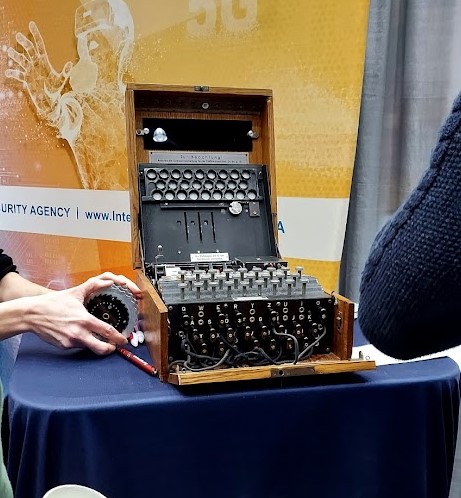
The Easter Eggs
I loved the small touches, as well. I smiled at the electric blue punch labeled "Fibonacci Fizz", and the free math posters. Each table had a small wooden puzzle or cube for decor - I had to stop and solve an abandoned, mixed-up Pyraminx cube. Just walking through the aisles, you were bombarded with cute math jokes and references. You could feel the energy and joy of everyone there. It felt a little less lonely, and a lot more fun.
The Research
Much of my time at JMM was reactive, rather than proactive. The exception: when my team actually presented our work, in an hour and a half undergraduate poster session. I practiced my one-minute spiel, waiting for someone to stop and talk to us.
It flew by fast. With each person I talked to, I became more engaged; with each question I answered, I became more confident. I learned what to expect, and polished my speech. Perhaps that's what happens when you work on something for so long: it gets easier, and less complicated, than when you first start out. It becomes a part of you.
The Pride
I think that a lot of attendees, regardless of their progress in academia or interests, felt a certain pride - including me. A woman in the elevator asked me how I was enjoying JMM. Being able to say, "Good - I just came back from presenting a poster!" was exhilarating. And when I asked if she was giving a talk, she said with just as much enthusiasm: "No, but I'm one of the organizers!"
And on the last day, as I was catching the airport shuttle with my poster tube in tow, a grad student stopped me and asked what I had presented. At TSA security, a stranger smiled and asked how I liked the conference. With something as simple as a poster, I felt important. I became a little more like everyone else: excited about my research, and excited to share it with anyone who would listen.
Since I don't want to pursue research as a full-time career (to the disappointment of many of my professors), I don't know if I'd ever feel 100% comfortable at a conference like JMM. Perhaps that's not so strange: we all have to start somewhere, and being able to attend is, in itself, a privilege.
And though my formal journey in mathematics may end soon, I hope to still keep the same sort of humor and (nerdy) interest that naturally comes with it. My apartment is filled with math decor, from quirky equation mugs to unit circle clocks, and my feed is populated with math and science memes. Being a mathematician has always been a part of my identity - I'm sure the same goes for everyone I saw in Boston. It affects how I think, how I live, and what I love.
May that influence never falter.
